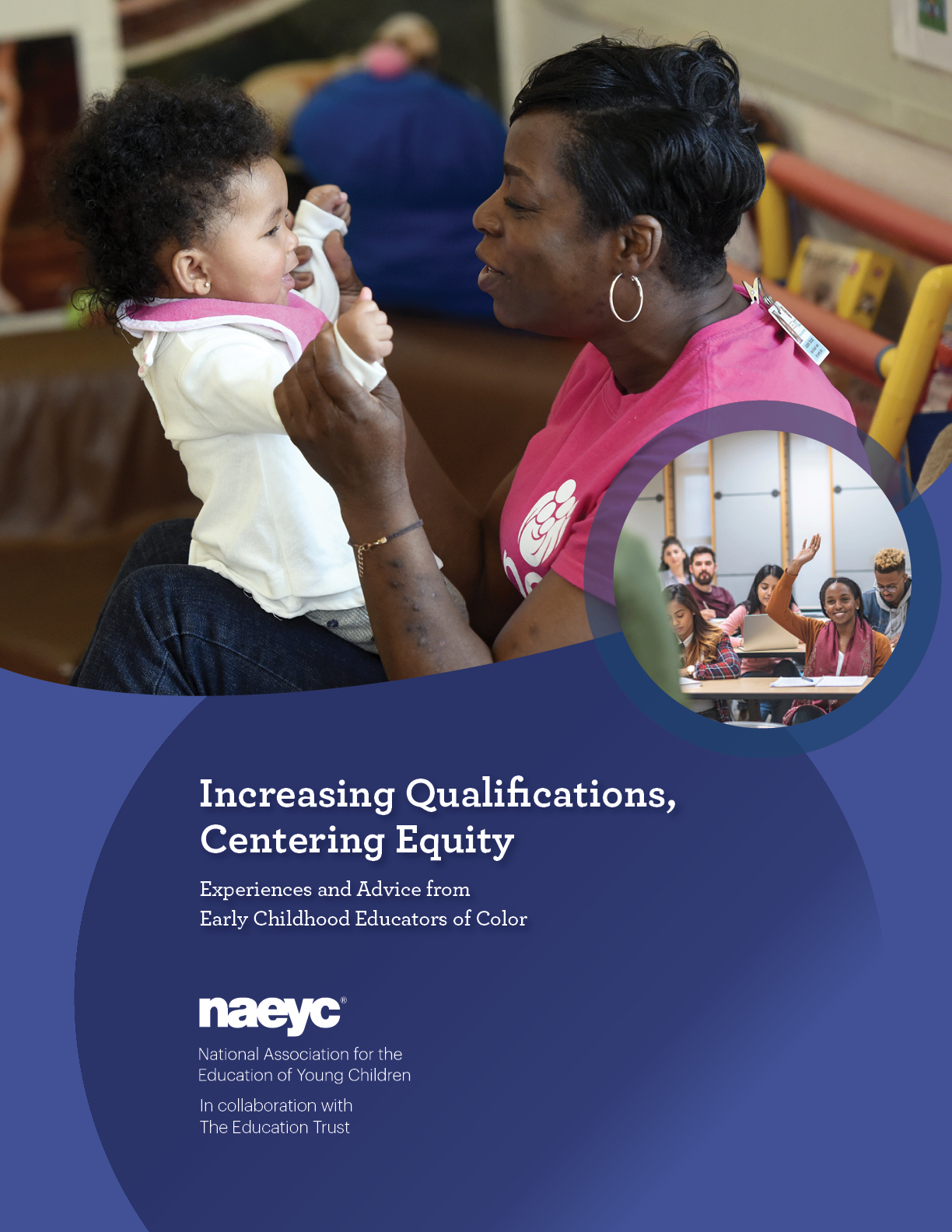Increasing Qualifications, Centering Equity: Experiences and Advice from Early Childhood Educators of Color

When members of Congress hold a hearing on an issue or bill, they invite “expert witnesses” to testify, asking them questions to help inform (and sometimes justify) their decisions and recommendations. In education policy, including early childhood education, leaders often look to “expert witnesses” to inform their work as well – by which they typically mean other people who work in policy, conduct research, and lead organizations. Yet as we collectively make decisions that affect their lives and livelihoods, there is no one better to bear witness than early childhood educators themselves. Committed to putting their voices front and center, and building on a shared interest in advancing #EquityinECE as we advance the early childhood education profession, NAEYC and The Education Trust decided to team up to meet 50 early childhood educators of color in New Jersey, North Carolina, and Wisconsin to elevate their expertise and experiences. The new report, Increasing Qualifications, Centering Equity: Experience and Advice from Early Childhood Educators of Color is the result of that collaboration.
Choosing whether, when, how, and for whom to raise the bar on the qualifications for working as an early childhood educator requires a complex set of decisions, data, and investments. Yet as our collective understanding of the crucial importance of the early years gives way to a focus on the knowledge, skills, competencies, and dispositions of those working with children in those years, we are obligated to concentrate on what it will take to raise expectations and qualifications at scale, while centering equity in the process. From firefighting to coding, our nation’s history is littered with examples of what happens when the requirements that qualify a person to be a member of any given workforce are increased, often in ways that reinforce systemic barriers and biases that disproportionately impact individuals from communities of color.
Early childhood educators can and must learn from these external examples. But the truth is that we didn't have to go far outside of our field to learn more about how to do this work right. A silver lining of the piecemeal national system of early childhood education is that some states and communities are further along in raising educational requirements and qualifications for early childhood educators than others. This means that individuals in those locations are perfectly poised to share their lived experiences and advice with the rest of the nation, and we are fortunate to have their voices to guide us as we move ahead. We encourage you to read the report in full and to listen deeply to the words of the educators themselves. Their journeys are enlightening, their advice is wise, and their hard-won expertise should be deeply valued.
"Financially support us so we can continue to get our education. We’re not saying we don’t want to do it. We need support.” -- Early Childhood Educator
Then consider the ten recommendations for policymakers poised to increase qualifications for early childhood educators so that we collectively do so in a way that maintains and grows the critically important diversity of our early childhood education field:
-
Make It Affordable and Accessible: Combining Debt-Free and Loan-Forgiveness Policies
-
Make It Possible: Reduce and Eliminate Non-Financial Barriers to Success
-
Make It Align with Our Realities: Count All Settings
-
Make It Meaningful: Establish Comparable Compensation for Comparable Qualifications
-
Make It More Efficient: Create Seamless, Articulated Teacher Preparation Pathways
-
Make It Feasible: Lessen the Time It Takes Educators to Reach Attainment
-
Make It Real: Value Experience With College Credit
-
Make It Supportive: Use Cohort Models and Mentors
-
Make It Consistent: Streamline Accountability Systems and
-
Make It Bigger: Think Outside the Classroom
We welcome your thoughts and reflections in the comments below, on NAEYC’s Hello! platform, and on social media, using the hashtag #EquityInECE. We also encourage you to read Equitably Expanding Educational Requirements: Insights from Diverse Early Educators, hosted on our partner New America's website, which delves deeper into this report and elevates even more voices from early chldhood educators of color.
The National Association for the Education of Young Children (NAEYC) is a professional membership organization that works to promote high-quality early learning for all young children, birth through age 8, by connecting early childhood practice, policy, and research. We advance a diverse, dynamic early childhood profession and support all who care for, educate, and work on behalf of young children. The association comprises nearly 60,000 individual members of the early childhood community and more than 50 Affiliates, all committed to delivering on the promise of high-quality early learning. Together, we work to achieve a collective vision: that all young children thrive and learn in a society dedicated to ensuring they reach their full potential.
